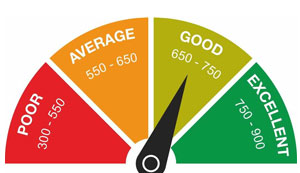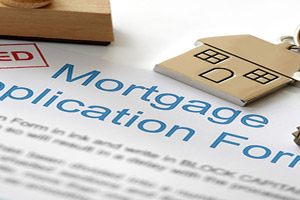Good Credit Score – When it Comes to Real Estate
Good Credit
What is ‘Good’ Credit in Real Estate?
In the real estate world, most experts agree that if your FICO score is at least 740, you’ll be eligible for the best interest rates that are offered at the time. However, for every 20 points your credit score comes in below this 740 threshold, you’re likely to have add-ons to the interest rate – and you may not be eligible for certain programs. So say, for instance, that you have a 740 credit score and you lock in a 4.125 percent interest rate on your mortgage loan. If your score came in at 700, your rate might be 4.5 percent, at 660 it might be 5 percent and so on.
The experts also agree that too low a credit score will result in either very high interest rates or in complete denial of your mortgage application. Generally speaking, this low range where things can become somewhat sticky is between 600 and 620.
In saying all of this, it is worth noting that whether a mortgage application is approved or denied, as well as the interest rate, is largely dependent on the lender that you’re working with. For instance, some lenders may be more flexible with low credit scores than others.
What if I Have Poor Real Estate Credit?
If you’re in the 600-620 gray area and are either unsure of whether your mortgage application will be approved or if you can afford a higher interest rate if it is approved, your best option is to work to repair your credit to make you a more attractive consumer in the future. Here are some tips and suggestions in doing so:
- Make sure you pay all of your bills on time. This is one of the largest weighed factors in determining your credit score.
- Concentrate on paying down high-interest debt.
- Check your credit report to ensure that it is error-free. (It’s estimated that the majority of credit reports have some sort of error on them.)
- Ensure that your debts owed is at or less than 30 percent of your total credit allotment.
- Only take out new lines of credit when necessary.
Average Credit Score for Home Buyer Mortgage Loans: 2017 Update
According to Ellie Mae’s %22Origination Insight Report,%22 that was the average credit score among home buyers that went the mortgage loan route in April of 2017. Any credit score of 700 or above is typically considered a %22very good%22 score, characteristic of someone deemed to be a good consumer. When it comes to credit scores, higher is always better, and higher scores typically qualify consumers for lower home loan interest rates. This can represent a significant long-term savings on either a 15- or 30-year mortgage.
According to Ellie Mae’s “Origination Insight Report,” that was the average credit score among home buyers that went the mortgage loan route in April of 2017. Any credit score of 700 or above is typically considered a “very good” score, characteristic of someone deemed to be a good consumer. When it comes to credit scores, higher is always better, and higher scores typically qualify consumers for lower home loan interest rates. This can represent a significant long-term savings on either a 15- or 30-year mortgage.
Average Credit Score for Home Buyer Mortgage Loans” src=”https://keycreditrepair.com/wp-content/uploads/2017/07/trident-mortgage-group-mortgage-loan-approval-with-keys-960×350.jpg” alt=”Average Credit Score for Home Buyer Mortgage Loans”
Home Buyer Credit Scores Explained
While the 722 credit score is the average of all home buyers that sought a mortgage loan in the month of April 2017, the Ellie Mae report’s data analysis extends beyond just this. For instance, it includes credit score data based on the types of mortgages that were sought in the particular month. The average score for those who bought with a conventional mortgage was 753, for those who bought with an FHA loan, 684, and for those that purchased with a VA loan, 708.
While the 722 credit score is the average of all home buyers that sought a mortgage loan in the month of April 2017, the Ellie Mae report’s data analysis extends beyond just this. For instance, it includes credit score data based on the types of mortgages that were sought in the particular month. The average score for those who bought with a conventional mortgage was 753, for those who bought with an FHA loan, 684, and for those that purchased with a VA loan, 708.
Buying a Home with Good or Poor Credit
While the 722 number was the average credit score for purchasing a home in April 2017, that’s not to say that those with lower credit scores that fall into the %22good,%22 %22fair%22 or %22poor%22 range would be unable to qualify for such a loan. However, if they are approved, their credit score will likely reflect the interest rate that would accompany their home loan. Generally speaking, the higher the credit score, the lower the interest rate. Over time, the savings can add up. In fact, consumers with good credit and low interest rates may save tens of thousands of dollars over the course of a home loan tenure compared to consumers with fair credit and high interest rates.
While the 722 number was the average credit score for purchasing a home in April 2017, that’s not to say that those with lower credit scores that fall into the “good,” “fair” or “poor” range would be unable to qualify for such a loan. However, if they are approved, their credit score will likely reflect the interest rate that would accompany their home loan. Generally speaking, the higher the credit score, the lower the interest rate. Over time, the savings can add up. In fact, consumers with good credit and low interest rates may save tens of thousands of dollars over the course of a home loan tenure compared to consumers with fair credit and high interest rates.
So if you’re among the consumer base with a credit score that may be on the bubble of getting approved for a home loan or just want to boost your score to earn a better interest rate on a home loan, you might be wondering what you can do. Here’s a look at some credit repair tactics to think about:
So if you’re among the consumer base with a credit score that may be on the bubble of getting approved for a home loan or just want to boost your score to earn a better interest rate on a home loan, you might be wondering what you can do. Here’s a look at some credit repair tactics to think about:
Pay all bills on time. Late payments can cause your credit score to take a hit, especially if you’re regularly doing it. Set reminders and alerts, or arrange for auto bill pay if you can. Pay down debts: Try to always keep your debt-to-credit ratio, or credit utilization, at about 30 percent for a better score. For instance, if you have a credit card limit of $10,000, try to carry a balance of no more than $3,000 at once. Reduce your debt by paying off high-interest loans and credit cards first. Check your credit report for errors.
- Pay all bills on time. Late payments can cause your credit score to take a hit, especially if you’re regularly doing it. Set reminders and alerts, or arrange for auto bill pay if you can.
- Pay down debts: Try to always keep your debt-to-credit ratio, or credit utilization, at about 30 percent for a better score. For instance, if you have a credit card limit of $10,000, try to carry a balance of no more than $3,000 at once.
- Reduce your debt by paying off high-interest loans and credit cards first.
- Check your credit report for errors.


